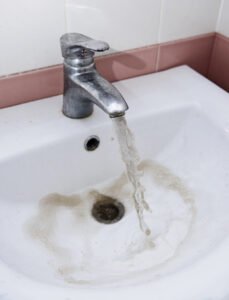
When your home has well water, there are some common plumbing issues to be aware of so that you can avoid them if possible.
For homeowners lucky enough to have their water supply from a well, there are unique benefits such as independence from municipal water sources and, often, better-tasting water. However, with this independence comes the responsibility of maintaining your own water system. While wells can provide a reliable water source, they also bring their own set of plumbing challenges.
Low Water Pressure
Low water pressure can be frustrating, whether it’s a trickle from the faucet or a weak stream from the showerhead. One common cause of low water pressure in homes with well water is a clogged filter or screen. Sediments, minerals, and other debris can accumulate in the filter over time, obstructing water flow. Regularly checking and cleaning the filter can help alleviate this issue. Installing a water pressure booster system is another effective solution to ensure consistent water pressure throughout the house.
Contaminant Buildup
Well water can sometimes contain minerals, bacteria, and other contaminants that affect its taste, odor, and even color. Contaminant buildup can lead to clogged pipes, water heater issues, and negatively impact the quality of water. Installing a water softener, filtration system, or UV disinfection system can significantly improve water quality by removing or neutralizing these contaminants.
Sediment Accumulation
Sediment buildup in the well and plumbing system is a common concern. Over time, sediments like sand, silt, and rust can settle in pipes, faucets, and appliances, causing clogs and reducing water flow. Regular maintenance, including well cleaning and flushing the plumbing system, can help prevent sediment accumulation. Installing a whole-house sediment filter is another preventive measure to ensure clean and clear water throughout the home.
Well Pump Issues
The well pump is the heart of your well water system, responsible for drawing water from the ground and delivering it to your home. Pump issues can range from mechanical failures to electrical problems, causing disruptions in water supply. If you notice reduced water pressure, unusual noises, or frequent cycling of the pump, it’s crucial to address these issues promptly. Regular well pump maintenance and occasional professional inspections can prevent unexpected breakdowns.
Water Quality Testing
Regular testing of well water is essential to ensure its safety for consumption. Contaminants such as bacteria, nitrates, and other harmful substances can seep into well water from various sources. Testing should be conducted at least once a year and more frequently if you notice changes in water quality, taste, or odor. Knowing the specific quality of your well water will help you implement appropriate treatments and safeguards.
Freezing and Burst Pipes
In colder climates, frozen pipes can wreak havoc on your well water plumbing system. When water freezes inside pipes, it expands and can cause pipes to burst, leading to leaks and water damage. To prevent freezing, ensure that pipes are properly insulated, especially in areas exposed to low temperatures. Running a small trickle of water during extremely cold weather can also help prevent freezing.
Call Mahon Plumbing Today
If you still have more questions regarding your plumbing, we here at Mahon Plumbing are here to help. We have been serving the wider Baltimore area since 1994, so we have 25 years of experience to back up our fantastic service! Call us at our Baltimore location at 410-766-8566 or our Pasadena location at 410-636-7944. Be sure to keep up with us on social media by following us on Facebook or Twitter.
